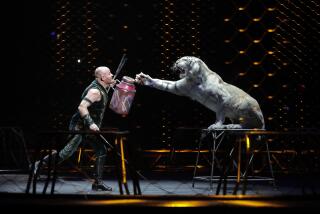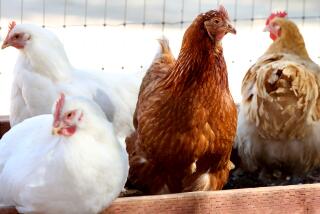Safety First : Public Opinion Is Having an Impact on Cosmetics Testing
- Share via
For those concerned that their beauty products may be causing unnecessary pain and suffering to animals used in product safety tests, there is good news. In response to pressure from consumers and animal-rights groups, increasing numbers of makeup and fragrance manufacturers are using alternative test methods.
In the past two months, Revlon Inc. and Avon Products have become the first major cosmetics corporations in the nation to stop using animals in tests. Revlon also announced that it will no longer deal with suppliers who test on animals, a commitment Avon has not yet made.
Cruelty-free products, as they are often called, were once distributed only by mail-order, health food stores and a few drug stores, but with the announcements by these major corporations, the products are now widely available.
“People take this issue very seriously. We have received a number of letters from consumers who use Giorgio products but wanted confirmation in writing that we don’t test on animals, and we were able to do that,” says Jacqueline Cohen, vice president of corporate communications for Giorgio, a division of Avon in Santa Monica.
Bills limiting the use of animals for cosmetics and household products testing are pending in Congress and in several state legislatures. U.S. Rep. Barbara Boxer (D-Greenbrae) recently introduced legislation that would require the government to investigate alternatives and encourage manufacturers to replace any outdated testing methods used involving animals.
In California, a bill that would ban the Draize Eye Irritancy Test was recently defeated. The 44-year-old test requires placing substances used in products such as mascara and eyeliner into the eyes of rabbits, while reactions are observed and recorded for up to three weeks. Supporters of the bill claim that the test is not only inhumane but also outdated and unreliable. The bill is scheduled to be reconsidered in January.
Holly Hazard, executive director of the Washington, D.C.-based Doris Day Animal League, says, “Non-animal safety tests have been developed that are more reliable, quicker and more economical than the old methods--and that’s the message we are trying to get across to legislators.” Some firms, including Avon, have switched to Eytex, an in vitro test using synthetic proteins to duplicate those in the human corneas.
Although the FDA doesn’t require any form of safety testing for cosmetics, a product that is not tested must say so on the label. “The animal testing is only done to protect companies from liability lawsuits,” says Beverly McGrath, a member of the board of directors of the Ventura County Humane Society and the originator, along with Dorothy Done, of the California bill . But Elaine Kite, of the Cosmetics, Toiletries and Fragrance Assn., an industry organization, disagrees: “All CTFA members want to protect consumers. They want animal testing to be available because certain tests simply cannot be replaced at this time.” Rachel Perry, a Chatsworth cosmetics manufacturer who has sold non-animal-tested products for more than a decade, views the decisions by Revlon and Avon as significant. “It’s about time the big companies joined us. Every single day, the letters pour in from people who want cruelty-free products. Public opinion is finally having an impact.”
For a list of firms that use non-animal testing, write: Doris Day Animal League, 111 Massachusetts Ave. N.W., Suite 200, Washington D.C. 20001.
More to Read
Inside the business of entertainment
The Wide Shot brings you news, analysis and insights on everything from streaming wars to production — and what it all means for the future.
You may occasionally receive promotional content from the Los Angeles Times.










